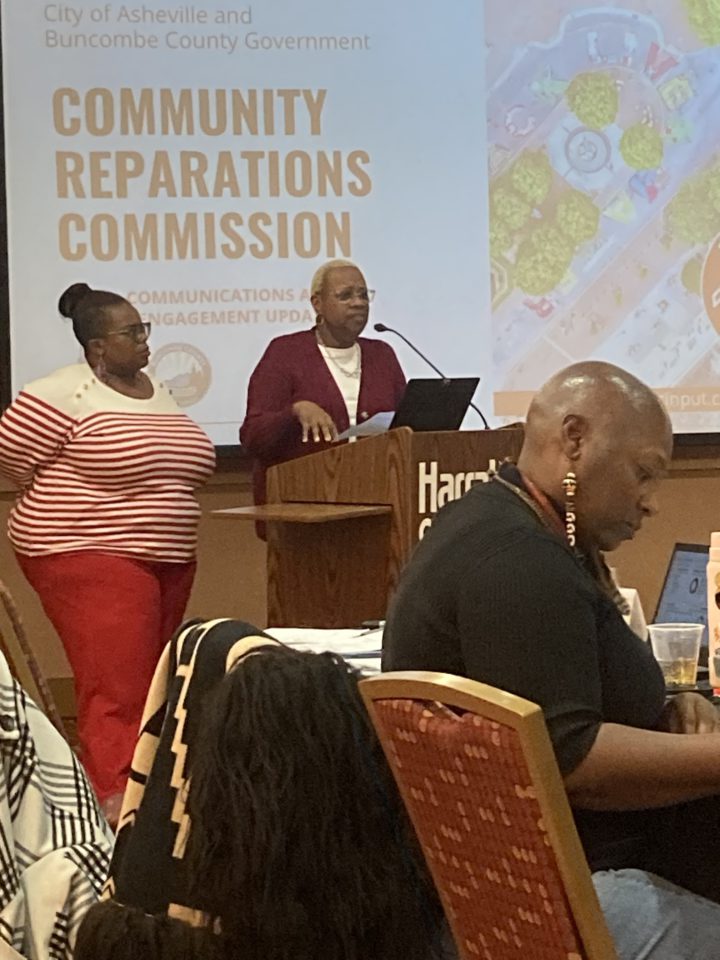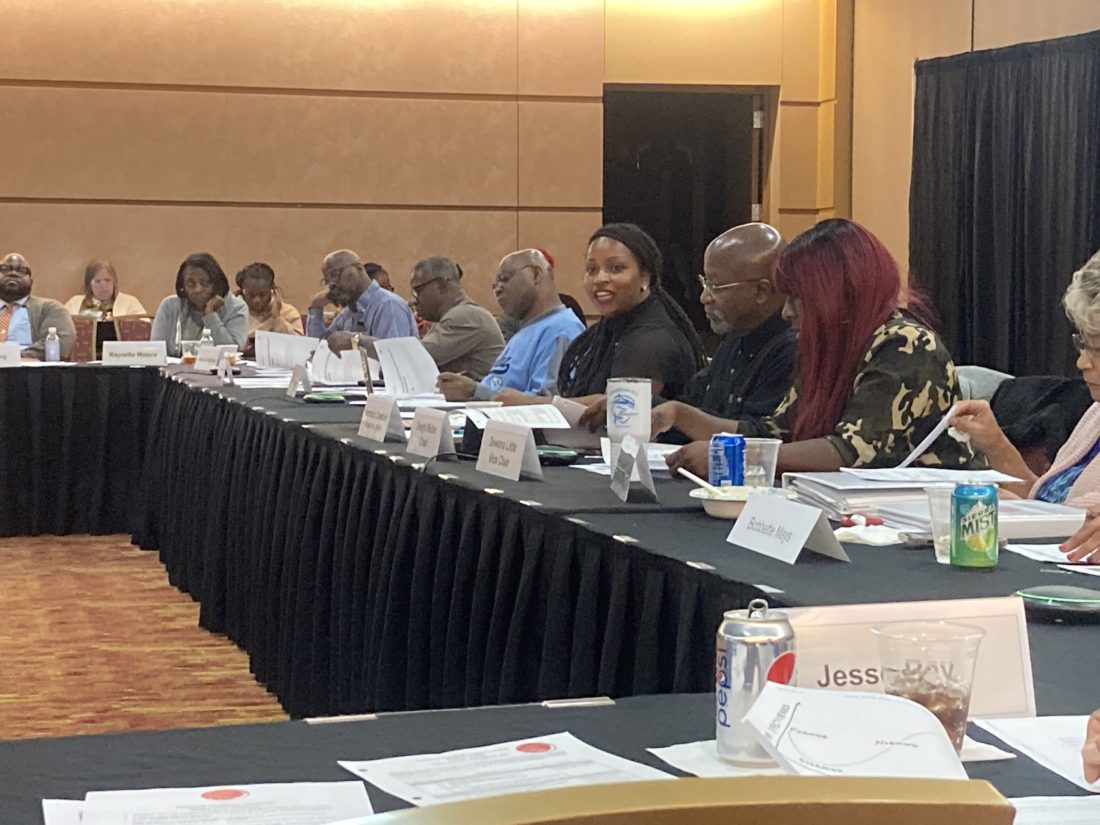After its project manager stepped down from most of her duties last month, the Community Reparations Commission of Asheville and Buncombe County solidified its structure and redefined the responsibilities of key leaders at its November meeting.
Vernisha Crawford, CEO of Charlotte-based Trauma Informed Institute — a professional development firm focused on trauma-informed approaches to improving workplace culture — took over meeting facilitation Nov. 6.
In her first move as facilitator, Crawford implemented a more rigid meeting process designed to allow more commission members an opportunity to speak while keeping meetings on schedule, things the 25-member commission had struggled to do at times.
She said the group was in the “storming” phase of team development, where members challenge leadership and each other.
“This is our first time we’re doing something really hard. We’ve never worked together in this large of a group. And when you get people like us who are passionate, who want to do right by our people … this is what happens,” she said.
“My job as facilitator is to move us into the ‘norming’ phase,” she said, meaning to help group members learn how to better communicate with one another and show each other respect.
The final step is the performing phase, when group members no longer focus on each other, instead giving their full attention to the task at hand, she said.
Brenda Mills, the equity and inclusion director for the City of Asheville, and Noreal Armstrong, chief equity and human rights officer for Buncombe County, will now tag team the coordination and development of a draft reparations report, Mills said.

Sala Menaya-Merritt, who has led several of the commission’s focus groups, has taken over as lead administrator of the focus groups, including reviewing their recommendations. She also will record minutes at the regular meetings.
Christine Edwards of Charlotte-based firm Civility Localized, who was project manager for the commission from November 2022 until last month, will stay on to handle contract payments and the payment of stipends to members and facilitators.
Crawford’s new facilitation style of allowing each member 1-2 minutes to comment and ask questions after each presentation — but not receive answers until after the meeting via email — drew mixed feedback from commissioners.
Initially, commissioner Roy Harris seemed to praise the new process, saying that there is a perception in the community that only a few people dominate the conversation during meetings.
Later in the meeting, commissioners DeWayne McAfee, Osondu McPeters and MZ Yehudah suggested amendments, including allowing presenters to respond to questions from commissioners during the meeting and giving more time to those with constructive feedback.
Crawford said she would consider amendments to her process as long as she could keep the two-hour meetings running on time.
Timeline extension debate
After passing a resolution asking the city and county for an eight-month extension to its initial two-year timeline at its October meeting, Mills requested further justification from the commission on why the extension is needed so she could explain it to the Asheville City Council and the Buncombe County Board of Commissioners.
“I think you need to give them a little bit more about why you would like to extend it and what does that look like moving forward? So what are you going to do differently than you’ve been doing [already]?” she asked.
Commissioner Keith Young, who wrote the original extension resolution, pushed back on why they were being asked to provide further justification when they already have a resolution in place.
“We passed a resolution early on in this process to ask the city and the county to pay money every single year indefinitely to reparations, which currently sits at $1 million a year. We didn’t even have a written resolution [initially]. It was spoken out loud in a meeting and voted on. And nobody asked for justification on spending money indefinitely toward reparations,” Young said.
“We have a resolution now that has been drawn out and written as to why we should have an extension. I feel like that should be [enough].”
Commissioner Dee Williams, who voted against the extension in October, countered that future city and county leadership could rescind the promise of indefinite funding, and if the reparations commission doesn’t deliver programs and budgets, it won’t earn the community’s respect.
Crawford gave Young one more minute to retort.
“Do not be afraid to run off the plantation and find freedom. Do not be afraid —” Young said before Crawford cut him short for being off-topic.
Crawford said the commissioners should put suggestions and questions related to the extension resolution in the monthly post-meeting survey to be considered by facilitators and staff.
Mills said she would take the resolution as-is to City Council and the county Board of Commissioners if reparations commissioners were happy with it.
“We’ve been instructed that we will do that if this is going to be a hardship or cause any kind of angst. We will be glad to do that,” she said.
Updates on focus area recommendations
Facilitators for each of the commission’s five focus areas — criminal justice, economic development, education, health and wellness, and housing — gave updates to the commission on the status of their draft recommendations.
Each focus group received input from city and county staff on its recommendations after the last monthly meeting, and some incorporated those suggestions into their drafts. Others have yet to meet after they heard from the city and county.
In economic development, facilitator Tara Brown said the group is working with the housing focus group to hash out details on how to access land that was taken during urban renewal decades ago, per recommendations from the city and county.
That group is researching other cities’ models of providing guaranteed income, like $500 a month, for certain segments of the population, Brown said. There are around 100 cities with policies such as guaranteed income or “baby bonds” — trust accounts to help build generational wealth — that they could imitate, she said.
Dionne Greenlee-Jones, facilitator of the health and wellness group, reported that they have found there are few people of color in the medical field in WNC who can help increase access to care in the Black community.
Greenlee-Jones said in conversations with state representatives, she learned there is a newly funded entity in the N.C. Department of Health and Human Services charged with looking at the lack of Black medical professionals statewide. She said despite that, there is no plan to recruit Black medical professionals.
“That means then that we’re going to be partnering locally, perhaps, and meeting with other entities, the CEOs of organizations to say, this is disturbing, and how can we move forward together as a community if this isn’t happening?” she said.
Over the next few monthly meetings, Menaya-Merritt said focus groups will give longer presentations of their developing recommendations as they continue to refine them and accept feedback from the wider commission.
December will include presentations from education and economic development. Housing and economic development will present their overlapping recommendations in January, and health and wellness, criminal justice and education will do the same in February, she said.
The commission expects a preliminary update on the Cease the Harm Audit in January, with a final report scheduled for February, Menaya-Merritt said. Focus group presentations will continue through the winter and into the spring, depending on the outcome of the extension resolution.



If this weren’t costing so much money for zero output it would be funny.
The new consultant’s firm does this—–“a professional development firm focused on trauma-informed approaches to improving workplace culture”. Huh? that runs how much and does what??
The new consultant is smart. She’s already subtly slammed her predecessor by stating they are in phase one. Two more phases identified, neither of which are described as last phase.
None of the recommendations are going to happen, because most are illegal in NC and under federal law. I guess some folks just like to run the $$$ meter, conduct important looking meeting, get hopes up for some and accomplish zip.
What a grift…
This expensive debacle is ripe for SNL treatment. None of these people have any consequence from slavery whatsoever, yet make ridiculous comments like “Don’t be afraid to run off the plantation and find freedom”. Handing a million bucks a year, minimum, to this ineffective bunch is just an insult to taxpayers working hard to make their own way instead of being perpetual victims.
This kind of divisive identity worship at the expense of the greater community is why we are so split as a country. Most of us couldn’t care less what your skin color is as long as you don’t condemn our skin color either, or demand special treatment for yours. Can’t we all just be Americans concerned with what’s best for us all long-term?
We wonder why people are so divided. Perhaps extreme identity politics like this provide an answer. Giving goodies to one skin color at the expense of all other skin colors has always been and will forever be racism. It should be condemned by one and all. Providing help to individuals in poverty who prove harm from bank practices like redlining is perhaps justified, but limiting government assistance to only blacks worsens the divide in our country. Poor people of all colors need help. Ask whites in poverty how much “privilege” they’ve experienced, and then ask.
#BLEXIT for the people now ! #NCBlexit Free your mind, join the movement.